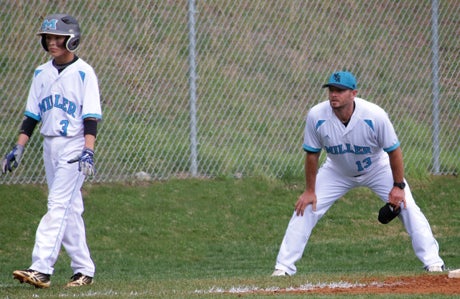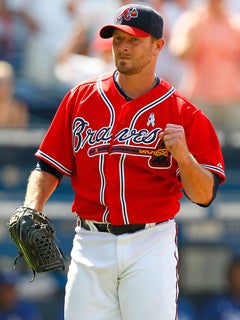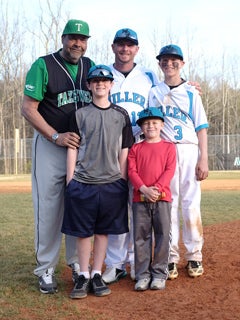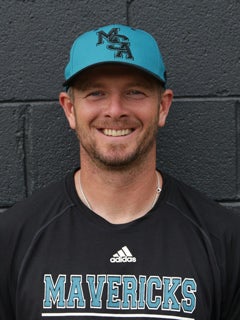
Former MLB closer Billy Wagner, right, coaches his son Will Wagner, left, at Miller School. The possible Hall-of-Famer enjoys coaching his sons and working with his charity that helps kids in Virginia graduate from high school.
Photo courtesy of Tom Pallante
Viable Hall of Fame candidate Billy Wagner had an outstanding 15-year Major League Baseball career, but he cut it short so he could return to his home state, coach his young sons and promote a charity that is dear to his heart.
The 41-year-old Wagner is deep into his first year as head baseball coach at
Miller (Charlottesville, Va.), where the starting second baseman is his eighth grade son,
Will Wagner. He also continues to be the face of 2nd Chance Learning Center, which since 2005 has given $85,000 in college scholarships to needy students from the southwestern Virginia area he was raised in.

Wagner with the Atlanta Braves.
Getty Images
Wagner told MaxPreps, "I could have pitched at least one more year. Probably more of a reason to retire was so I could be around my kids and coach them. By the luck of the draw I was able to come home and have a coaching job to be around my (three) boys and my daughter. I (also) coach two travel teams (with a son on each one). My hobbies are my kids and whatever they want to do."
Miller, a private school of 170 students in grades 8-12, already has posted some big victories under Wagner, who coached the JV squad to a 10-2 record last year.
"We had a really big win on Saturday against the No. 2 team," Wagner said. "The kids got all excited. Come Monday morning, they haven't accomplished anything, because it's a new week."
Earlier in the season, Wagner's Mavericks twice defeated Tazewell (Va.) by 7-3 and 4-0 scores. Those wins were significant because Tazewell still is guided by his former high school coach, Lou Peery, now in his 34th year at the school.
He called the matchup "a very neat experience, because you always want to impress and show you learned something. It was a great experience just to be on the field with him. He is a great friend and always has been there for me. He's probably one of the main reasons I want to coach, because he taught me a lot ... if I can be one-half the coach he is."
Peery noted, "They've got the makings of a good team, but only because of him."
The veteran coach read off Wagner's 1990 senior statistics: .451 batting average, 23 stolen bases, 29 runs batted in, 116 strikeouts in 46 innings, a 7-1 pitching record and a 1.52 ERA.
Most of his school records have been surpassed, because he is the target - the measuring stick - for every Tazewell baseball player.
Peery revealed that Wagner did not want to pitch in high school, as he also played center field.
He explained, "He was an outstanding high school player. He was just small (5-foot-5, 135 pounds as a senior). He was great as far as hustle, desire and work habits. He didn't get a lot of (college) offers. He was very quick and his arm strength was very good. He just needed some leg and core work to get his (arm) speed up. He was very raw in pitching, but just threw the ball past kids at this level."
Wagner wasn't afraid to chew on his teammates if he thought they weren't giving maximum efforts.

From left to right: Front, Jeremy Wagnerand Kason Wagner. Back, Lou Peeryof Tazewell (Va.), Billy Wagner andWill Wagner.
Photo courtesy of Tom Pallante
Peery recalled, "Even as a freshman or sophomore, when things weren't going right, he'd let his teammates know. He's always been a person who liked to work hard and wanted everybody around him to work hard."
On and off the field, Wagner has been received at Miller with open arms. Headmaster Rick France said, "He's not just a ballplayer who happens to coach a team. He's such a positive influence on the kids."
Assistant coach Tom Pallante admits he was somewhat in awe of Wagner at the beginning of the season.
"I felt almost inadequate," he said. "It's hard to overcome following a future Hall of Famer."
One day Wagner left his glove on the mound after throwing batting practice and told Pallante to pick it up and finish.
"Are you serious?" Pallante asked. "You want me to put my hand in your glove?"
Pallante soon got over his awe, because the easy-going Wagner has made everyone around him feel at ease.
The assistant coach quickly found out, "He doesn't push his status in any way. He kind of makes you feel equal. I can't overemphasize how positive this experience has been. I've learned (so much) about baseball in the last two months. He's still like a big kid himself. He has the perfect balance of fun and energy. He has a knack of working with younger kids - the younger the better. (When new students apply) he talks academics first."
Wagner certainly gets lots of work with younger players because his roster includes just two seniors. He also is working with two juniors, three sophomores, six freshmen and three eighth-graders. The three eighth-graders all are starters.
He believes his methods may be a little unorthodox.
He explained, "Only time will tell, but my philosophy of coaching is a little different. I'm not a win-at-all-costs coach. I'm a fundamentals coach. I tell the kids, 'I'm not here to make you a professional baseball player.' We work on a lot of fundamentals. These kids are here for the education. We put all our kids in college."
The perennial National League All-Star already has had his eyes opened while embracing his new occupation.
He noted, "I realize that dealing with 15 different kids, you have to communicate in 15 different ways. They are like sponges. I truly enjoy it. A lot of times they don't want to leave, so I don't leave until they want to leave. For me it's been a great opportunity."
Wagner also embraces the opportunity to give back to his home state through the 2nd Chance Learning Center, which has two offices, but is based in Bluefield, Va.
He related, "Our philosophy is that we can't change the world, but we can change our area. We've seen tremendous changes in the kids' lives and they become very productive and successful. It's definitely personal because of the way I was raised (his parents split when he was 5 and the family struggled economically)."
Wagner's former roommate at Ferrum College, Erik Robinson, is the charity's executive director.
Robinson explained that the charity was started due to the alarming school dropout rate in their area of Virginia, the northern reaches of the western part. It combines tutoring, mentoring and counseling for students in grades 6-12. It employs 16 people and some part-timers and works with students from six high schools in the Tazewell area. Schools recommend students and there is a long waiting list.
He said proudly, "Last year we worked with 53 kids and 52 either graduated or passed (to the next grade). I'm really proud of that. Every kid comes to us at-risk. Most of the kids we get are from blue-collar families who live from paycheck to paycheck."
The charity, which has helped around a dozen students receive college diplomas, holds fundraisers throughout the year, the big one being a concert that drew around 18,000 people last year. The college grants range from $2,500 to $5,000 per year, depending on need. Officials also help students buy food, clothes, books and more.
Wagner's outstanding career was built on adversity, so he can empathize.
First of all, he broke his right arm twice from ages 4 to 6. With a cast on his right arm, he taught himself to do things left-handed - a major advantage for a baseball pitcher.
"Thank God that happened," he said.. "I was always the littlest on every team. I was able to use that as a motivation rather than sympathy. I was going to play harder and work harder. Football was my favorite sport (quarterback and defensive back), but that didn't work out unless you were Doug Flutie."
At 5-5, 135 during his senior year at Tazewell, Wagner said he threw about 78 mph. He did a good job of hiding his pitches until he cut loose and he was "effectively wild" enough to keep hitters loose.

Billy Wagner
Photo courtesy of Tom Pallante
Still he went to Division 3 Ferrum College in central Virginia, where he dropped football after one year to concentrate on baseball. He grew and got his fastball up to 95 mph. In 1992 he set NCAA records with incredible nine-inning averages of 19.3 strikeouts and 1.88 hits allowed.
He credits good coaching, improved mechanics and a lot of physical maturity with enabling him to become a feared strikeout pitcher despite his average size.
Taken by the Houston Astros during the first round of the 1993 Major League Draft, Wagner entered pro ball as a starting pitcher at 5-10, 170 pounds.
However, he admitted, "I did not want to start, period. I wanted to pitch every day. I don't think I had the mindset to be a starter. I didn't think I had the stuff. If I had a bad game, I'd have four days to think about it."
Again, adversity - this time in the form of injuries to John Hudek and Todd Jones - enabled Wagner to take advantage of an injury and become Houston's closer in 1996.
He explained what it takes to be a closer: "The mentality of a closer is the ability to forgive and forget the day before. I don't think about successes and failures."
As his weight rose to 215 pounds, he began to consistently reach the magic number with a 100 mphfastball to go with an 88 mph slider.
"I was very humble," he said. "I never looked back. There was no indication that with my size I was going to throw 100 mph. Everybody came up to Scott Elarton (6-5, 260) and asked for my autograph. They see your size instead of seeing your talent."
Over 15 years, Wagner was a seven-time National League All-Star and was named 1999 NL Rolaids Relief Man of the Year. Pitching for five teams, he concluded his career with 422 saves - No. 5 in Major League history. He pitched in 853 games with a 47-40 record and 2.31 ERA. He also had 1,196 strikeouts.
Wagner went out in a blaze of glory, striking out the final four batters he faced in his last game and helping Atlanta Braves manager Bobby Cox win his final game before retiring. He was still throwing 96-98 mph.
His numbers would have been even better had he not been injured several times and undergone surgery.
"It probably cost me a total of two years with elbows," he said. "I probably wouldn't change it, because I felt after each injury I was better."
Every pitcher has a special nemesis and for Wagner it was catcher Miguel Olivo. Wagner pointed out, "He was a career .230 hitter, but I don't think I ever got him out. It made it a little easier because he was a good guy."
The possible Hall of Famer is happy to be back home and credits his wife of 18 years, Sarah, a former college basketball player, for being an anchor during his career.
He said, "I thank God to have my wife and kids around me for 15 years, to guide and ground me. You can get too hard or too high on yourself."
Wagner will be eligible for the Cooperstown Hall of Fame in 2016. He could be a first-year selection.
"The first year is possible," he said, "but that's a tough place to crack into. It's an honor just to be mentioned in that situation."
Meanwhile in the present, Wagner continues to coach third base and pitch batting practice daily. He even has developed some great off-speed pitches, which he never had as a professional.
He can't be blamed for closely watching his son, Will, a 5-4, 110-pound eighth grade second baseman, who is hitting .387 and batting No. 9 in the lineup.
"I probably have more expectations for him as far as knowledge of the game. He probably knows the game better than I do. He's more of a student of the game. I was just 'Whoa! He's always where he's supposed to be.' They predict him to be taller than I was."
Pallante added, "Fundamentally, he's easily the soundest kid we have. From the standpoint of knowledge, he's light years ahead. He's a coach, too. He coaches our 12th graders. His head is just so far into the game."
A saying has emerged around the baseball camp, Pallante revealed. When things are going well players and coaches give each other a "thumbs up" sign.
All signs point to Coach Billy Wagner deserving the biggest "thumbs Up" of them all.